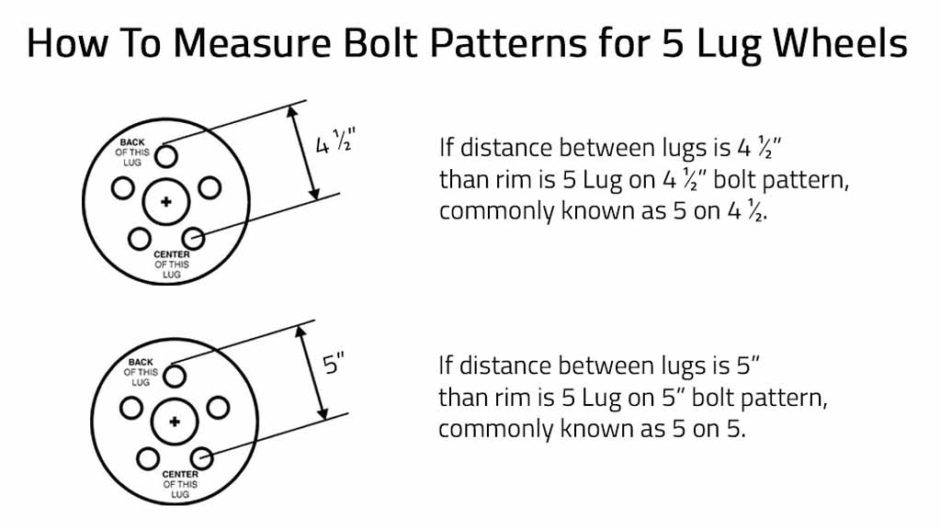Decoding Trailer Wheels: Your Guide to the 5 on 5 Bolt Pattern
Ever feel overwhelmed by the sheer number of options when shopping for trailer wheels? You're not alone. One crucial aspect to consider is the bolt pattern, and today we're diving deep into the popular 5 on 5 configuration. It's like finding the perfect pair of shoes – it has to fit just right.
The 5 on 5 bolt pattern, often expressed as 5x5 or 5x127mm, refers to wheels with five lug nuts arranged in a circle with a diameter of 5 inches (or 127 millimeters). This measurement is crucial for ensuring compatibility between your trailer's hub and the wheel. Imagine trying to force a square peg into a round hole – it just won't work. The same principle applies here; a mismatch can lead to instability and even dangerous driving conditions.
While the precise origin of the 5 on 5 bolt pattern is difficult to pinpoint, its widespread adoption can be attributed to its use in various light-duty trucks and SUVs, which often serve as tow vehicles. This prevalence naturally led to its adoption in the trailer industry, creating a readily available and cost-effective solution for trailer manufacturers.
The 5 on 5 configuration is particularly important for maintaining the safety and stability of your trailer. A properly matched wheel and hub assembly ensures even weight distribution and prevents wobbling or detachment during travel. Think of it as the foundation of a house – a solid base is essential for everything built on top.
One of the main issues associated with 5 on 5 trailer wheels, or any wheel for that matter, is improper installation. Over-tightening or under-tightening lug nuts can lead to damage, wheel failure, or even detachment. Regular maintenance and inspection are essential to prevent these problems.
A 5x5 wheel has five lug holes spaced evenly around a 5-inch diameter circle. For example, many boat trailers and utility trailers utilize this bolt pattern.
Benefits of using the 5 on 5 bolt pattern include a wide selection of readily available wheels, compatibility with various trailer types, and a generally lower cost compared to less common patterns. This commonality simplifies replacement and offers choices ranging from steel to alloy options.
Before purchasing wheels, measure your trailer hub's bolt pattern. Use a ruler or tape measure to confirm the 5-inch diameter. Once confirmed, choose a wheel with the correct load rating for your trailer's weight.
Advantages and Disadvantages of 5 on 5 Bolt Pattern
| Advantages | Disadvantages |
|---|---|
| Wide availability and selection | Can be mistaken for other 5-lug patterns |
| Generally lower cost | May not be suitable for heavy-duty trailers |
| Compatible with various trailer types |
Best practices for implementing 5 on 5 bolt pattern trailer wheels include: 1. Always torque lug nuts to the manufacturer's specifications. 2. Regularly inspect wheels for damage or wear. 3. Ensure proper wheel bearing lubrication. 4. Use a calibrated torque wrench for accurate tightening. 5. Choose wheels with an appropriate load rating for your trailer.
Frequently Asked Questions:
1. What does 5 on 5 bolt pattern mean? - It refers to five lug nuts on a 5-inch diameter circle.
2. How do I measure my trailer's bolt pattern? - Measure across the center of the hub from the center of one lug hole to the center of the opposite lug hole.
3. Are all 5-lug patterns the same? - No, other 5-lug patterns exist with different diameters, like 5x4.5.
4. Can I use a 5 on 4.5 wheel on a 5 on 5 hub? - No, the bolt patterns must match exactly.
5. Where can I buy 5 on 5 trailer wheels? - Automotive parts stores, trailer supply stores, and online retailers.
6. How do I know what load rating I need? - Check your trailer's GVWR (Gross Vehicle Weight Rating).
7. What are the signs of a loose wheel? - Wobbling, vibration, or unusual noises.
8. How often should I check my trailer wheel lug nuts? - Before each trip and after the first 50 miles of a long trip.
Tips and Tricks: Use a star pattern when tightening lug nuts to ensure even pressure distribution.
In conclusion, choosing the correct trailer wheel bolt pattern, like the common and versatile 5 on 5 configuration, is essential for safe and reliable trailering. Understanding the significance of this seemingly small detail can prevent potential hazards and ensure smooth travels. By following best practices, performing regular maintenance, and understanding the specifics of your trailer's requirements, you'll be well-equipped to hit the road with confidence. Remember, a little knowledge about your trailer wheels can go a long way in preventing headaches down the road. Taking the time to double-check compatibility and maintain your wheels will not only protect your investment but also ensure a safe and enjoyable towing experience. So, before you hook up and head out on your next adventure, give your trailer wheels a quick once-over—you'll be glad you did!
Beautiful flower emojis and symbols copy and paste guide
Cumberland county nj arrests information
Ace the california drivers written test














